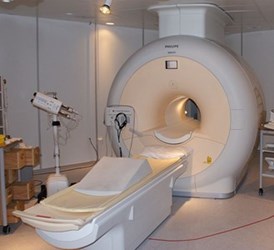Medtronic Wins FDA Approval For Suite Of MRI-Compatible Cardiac Devices
By Jof Enriquez,
Follow me on Twitter @jofenriq

Medtronic says it has become the first medical device manufacturer to be granted clearance from the U.S. Food and Drug Administration (FDA) for its line of MR-conditional pacemakers, implantable cardioverter-defibrillators (ICDs) and cardiac resynchronization therapy-defibrillators (CRT-Ds), as well as leads for scanning under both 1.5 Tesla and the faster, higher-resolution 3T Tesla magnetic resonance imaging (MRI) machines.
Historically, MRI examinations of patients with implanted cardiac devices were considered risky due to potential electromagnetic interaction between the MRI scanner and those devices. These interactions could result in device malfunction or failure to deliver appropriate, life-saving therapies.
MRI, however, has become an imaging modality of choice to follow-up co-morbid or other chronic conditions, such as stroke or cancer, in an increasing number of patients who have received these implants. Safety protocols and advancing device technology have made MRI scans with selected devices possible. But less than 1 percent of the approximately 12-16 percent of people with cardiac devices who need MRI scans each year are able to receive one, according to Medtronic.
With MRI's increasing diagnostic use, FDA has encouraged manufacturers to hasten the development of MRI-compatible devices. Biotronik, Boston Scientific, St. Jude Medical, and Medtronic have responded by launching MRI-compatible cardiac devices in recent years.
Medtronic received FDA clearance for its Evera MRI SureScan ICD System, the first-ever implantable cardioverter defibrillator (ICD) device deemed safe for full-body MRI scans, in September 2015. The Ireland-based company now claims to be the first company to have a full suite of MR-compatible cardiac implants, in addition to its portfolio of MR-conditional deep brain stimulation (DBS) devices and spinal cord stimulators (SCS).
"Our goal is to help patients get the cardiac device therapy they need while ensuring they also retain access to other needed tools, such as diagnostic MRI," said David Steinhaus, M.D., VP and GM of the Heart Failure business, and medical director for the Cardiac Rhythm and Heart Failure division of Medtronic, in a news release.
The FDA approval covers cardiac devices and leads to be scanned under both the more common 1.5 Tesla MRI machines, and newer 3T machines, which offer faster scan times and greater image quality, particularly of soft tissues, which is helpful in diagnosing brain and spine disorders. Patients with the following MR-compatible products now can safely undergo MRI examinations using both machines:
- Advisa MRI Pacemakers and Micra Transcatheter Pacemaker
- Amplia MRI and Compia MRI Cardiac Resynchronization Therapy Defibrillators
- Evera MRI and Visia AF MRI DF-1 and DF4 Implantable Cardioverter Defibrillators
- Reveal LINQ Insertable Cardiac Monitor
- SureScan Pacing, Defibrillation and Left-Heart Leads
"While 1.5T scanners still comprise the majority of installations, 3T scanners are expected to comprise more than half of new units – with some centers having only 3T scanners – since they offer faster scans and higher resolution images," said Yair Safriel, M.D., neuroradiologist and CMO at Pharmascan Clinical Trials and University of South Florida.
